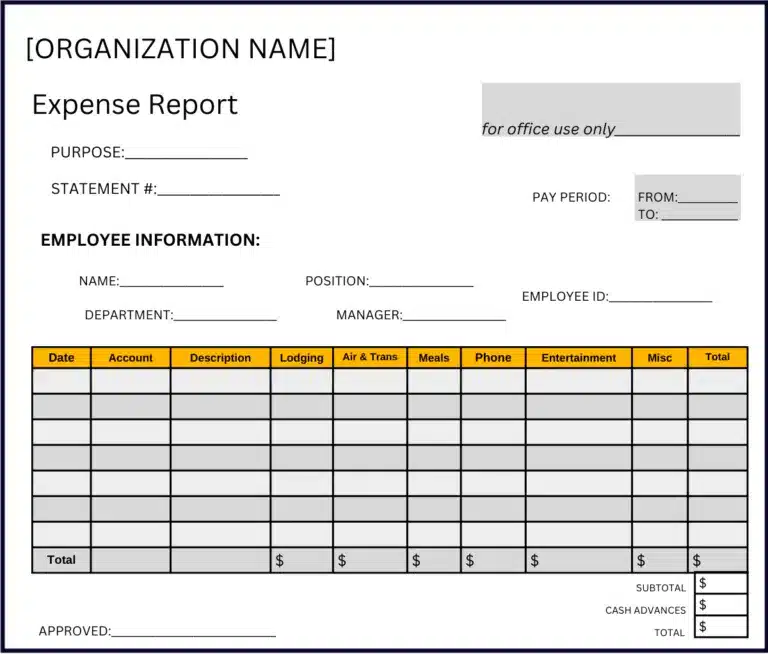Companies use expense reports to approve and reimburse employees for their expenses incurred on behalf of the company. Businesses seeking efficiency are replacing old-style paper expense reports, receipts, and checks with mobile app or online expense report submission and electronic payments.
Expense report automation software, including AP automation, helps your business achieve optimal spend management and business process efficiency by:
- Strengthening controls and global regulatory compliance
- Automating approval workflows
- Streamlining business processes
- Eliminating unnecessary steps like chasing down lost paper expense reports and hounding approvers
You can learn how to use, process, pay, and record expense reports as part of the AP cycle using best practices.
What is an Expense Report?
An expense report with receipts is used by businesses to document, approve, and pay the reimbursement of employee expenses. These are typically charged on personal credit cards or paid with their own money.
Types of expenses can include airfare, lodging, car rentals, travel, entertainment, meals, business mileage, ground transportation, professional license fees, and training courses.
In some circumstances, nonemployees may also be allowed to submit expense reports for reimbursement to a company.
Expense Report Template Example
In a business, all employees use the same expense report template selected by their company.
An expense report template might look like this:

How to Fill Out an Expense Report
Steps to fill out an expense report include:
- Enter your name, department, and employee ID number.
- Date the employee expense report.
- Provide a brief description of the business purpose of the expenses submitted for reimbursement.
- Enter the date, type, and amount of each expense in the related column.
- Attach receipts paid by credit card or cash, or submit images of receipts for each expense.
- Total expenses by each expense category column, for the total amount by row, and as a Subtotal in the last column.
- Subtract any cash advances you’ve received from the company.
- Calculate the balance due for reimbursement, as the Grand Total.
- Sign the expense report (digitally for an online expense report).
The expense report is filled out by the employee and submitted to the accounts payable department through the expense reporting process. Account coding will be done or checked first. Then, the expense report will be approved by a supervisor, manager, or small business owner with budget authority, and finally paid.
If some expenses aren’t approved as part of the reimbursement amount, a revised expense report will be required or a lesser amount will be paid after electronic communication.
Only reasonable expenses with a justifiable business purpose should be approved for payment by the company as a reimbursement. Businesses don’t reimburse what they consider to be personal expenses of the employee.
Qualified employees in the following categories can take employee business expense deductions for unreimbursed employee expenses. They use IRS Form 2106, Employee Business Expenses to take the tax deduction.
According to the IRS at tax time, “qualified employees” for unreimbursed employee business expense deductions on tax returns include:
- “Armed Forces reservists
- Qualified performing artists
- Fee-basis state or local government officials
- Employees with impairment-related work expenses
No other type of employee is eligible to claim a deduction for unreimbursed employee expenses.”
A Faster Way: Expense Report Software
Expense report software streamlines processes, providing benefits for employees and employer. The software offers digital receipt capture, faster preparation and review, and eliminates the need for time-consuming paper expense reports. It verifies calculations and global compliance, automates approvals, and offers EFT payment via ACH bank account direct deposit into the employee’s account.
The employee may be able to choose other payment methods offered through the expense report software or automated global payments software.
Expense report software, including AP automation software, works through ERP integration to track expenses, control expenditures, and provide more functionality in a seamless way. It allows you to record expense and payables transactions into your ERP system or small business accounting software.
Employees may select a mobile expense report app to submit data when filling out expense report forms.
Streamline Spend Management with Tipalti Expenses
The Tipalti platform provides a unified solution for managing accounts payable, procurement, company cards, expenses, and global remittance.
Tipalti Expenses is a feature that automates spend control over employee expenses. Companies can quickly and easily manage all expenses in a single dashboard. The tool helps you rapidly and efficiently scale, while reducing risk and accelerating business visibility.
Using the mobile app, staff can create and submit expense reports, while supervisors review and approve expenses quickly, easily, and from anywhere on the planet.
Tipalti’s procurement solutions work to accelerate monthly close by over 25% and reduce your team’s workload with automated reconciliation and tracking. Expense-based transactions and reimbursements are instantly captured and processed just like any other Tipalti-supported payment method.
Thanks to it’s robust global payment infrastructure, finance teams can use Tipalti to quickly and easily reimburse employees no matter where they are located. Whether it’s for new office equipment or business trips, managers can conveniently review and approve employee expenses via the mobile app.
Expense Report FAQs
How do you create an expense report in Excel?
To create an expense report in Microsoft Excel:
1. Select New in the left menu of the Excel program, or if templates are visible near the top of the opening screen, select view more templates.
2. Search for “expense report” in the “search for online templates” box.
3. Choose and click on the template you like.
4. Click the Create icon.
5. Use and save the template for creating an expense report.
Preferably, use a standard expense report template that your company has selected and uses companywide.
Who can submit an expense report?
Employees needing reimbursement for business-related expenses can submit an expense report to their company’s payable department. Expense reports are approved for payment by the employee’s authorized supervisor or manager.
In some cases, non-employees will also submit an expense to a company for reimbursement.
For example, attorneys will submit an invoice to a client that includes reimbursable expenses incurred in connection with their services. The attorney submits an expense report to their own law firm and charges client-connected expenses to billing codes for later reimbursement.
Airlines and travel insurance companies may be responsible for repaying the expenses of customers incurred from flight cancellations. Southwest Airlines canceled 15,750 flights from December 22 through December 28, 2022, due to winter weather and widespread failures in systems, staffing, and plane locations during holiday season travel.
What is a monthly expense report?
A monthly expense report created by an employee is for reimbursement of all of their expenses made on behalf of the company during the period of one month. Employees may also submit expense reports at the end of a business trip instead of accumulating expenses for the entire month.
Businesses may use the term “monthly expense report” to refer to their monthly total business expenses prepared through the bookkeeping process, as summarized in the general ledger or an income statement.
Ready to automate all employee-initiated spending, including expense report reimbursements?
Use Tipalti Expenses for efficient employee spend control and global reimbursement, app-based expense report submission and approvals, automated expense policies to enforce spending limits, real-time payments reconciliation to speed accounting close by up to 25%, and global regulatory compliance.
Importance of Expense Reports
Expense reports are important because they let employees receive reimbursement for valid and approved business expenses for which they will pay the supplier directly. Expense report forms are submitted with receipts as proof of spending. The company’s employee expense policy will state any minimum amount requiring a receipt (such as $20) to substantiate the amount of employee spending.
Businesses record expense reports as accounts payable that will be paid by the company upon approval. As the debit side of the entry, the accounts payable team codes the expenses to the applicable accounts, such as the travel category, auto mileage reimbursement, training courses, or professional license fees.
Companies using well-designed expense reports and expense report software can track business spending by each employee, department, and project for spend analysis. Managers and businesses compare actual spending to budget amounts. Using this information, companies implement cost control during the year.
Conclusion
Companies reimburse expenses by verifying and approving valid employee expenses specified in a company policy. Typical employee expenses include travel expenses, business mileage, meals, training courses, and professional expenses.
Expense report software provides expense management and efficiency for submitting, approving, and electronically paying mobile app or online expense reports.
Modern finance departments using best practices are accelerating automation of business processes, including accounts payable, receipt scanning, global payments, and expense management. Get started with Tipalti Expenses for employee expense management and reimbursement.

